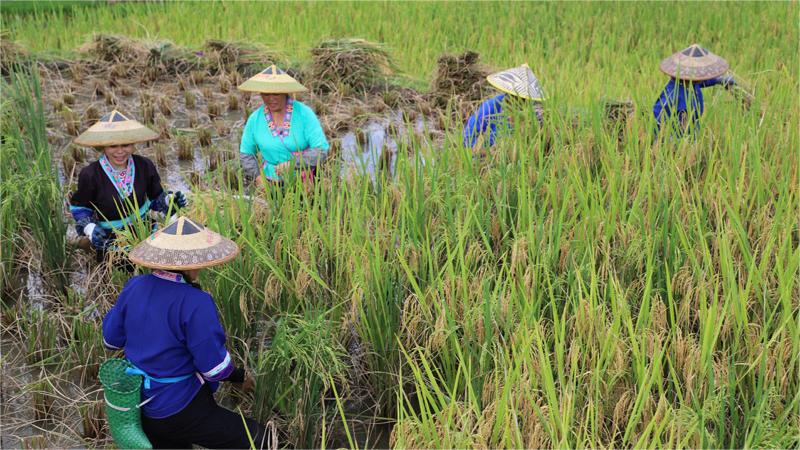Mislabeling "overcapacity" hinders global progress
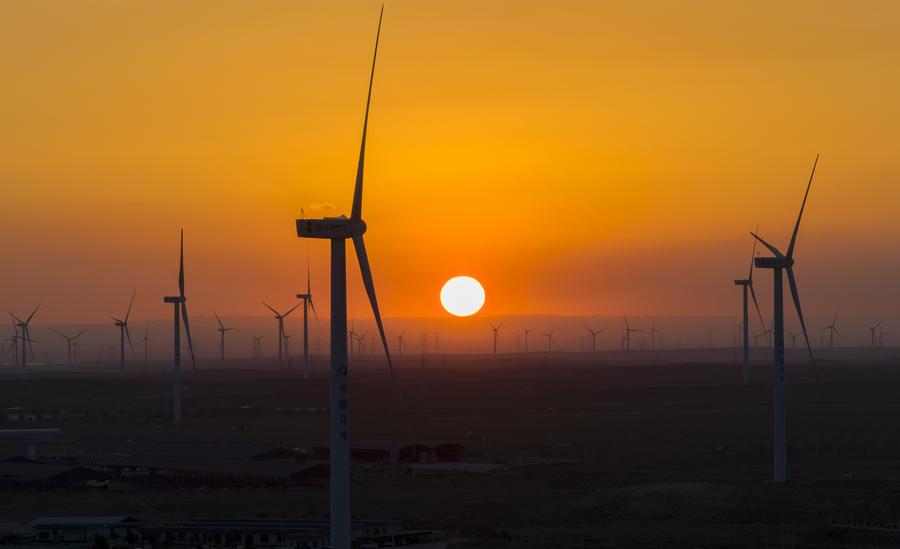
An aerial drone photo taken on Aug. 20, 2024 shows a wind farm of China Huadian Corporation Ningxia Branch in Lingwu City, northwest China's Ningxia Hui Autonomous Region. (Xinhua/Yang Zhisen)
Experts have warned that adopting protectionist measures to suppress China's advantages in the new energy sector and other fields will hinder green transition and global cooperation on climate change.
BEIJING, Sept. 2 (Xinhua) -- The hyping of the so-called China's "overcapacity" risks hindering global technological advancement and green transition, harming the interests of consumers worldwide, and exacerbating global economic risks, experts have pointed out.
The hyping by some Western politicians and media outlets aims to extend their suppression of China from the new energy sector to a broader range of industrial products.
It is in essence a protectionist act that intends to suppress emerging countries through bullying tactics by politicizing and weaponizing the economic concept of "overcapacity," policymakers and analysts have increasingly come to agree.
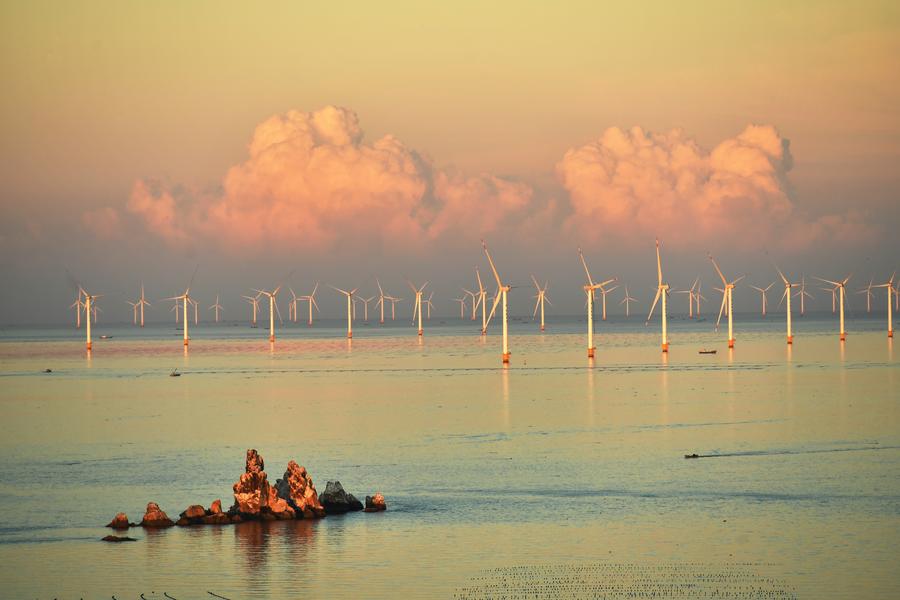
This photo taken on Sept. 13, 2023 shows an offshore wind farm in Dalian, northeast China's Liaoning Province. (Xinhua/Yang Qing)
FALLACIOUS ALLEGATION
The rhetoric of overcapacity contradicts factual evidence and fundamental economic principles upon a closer examination of the supply-demand relationship, global labor division, and future developmental trajectories, said industrial experts earlier at the China Economic Roundtable, an all-media talk platform hosted by Xinhua News Agency.
Supply-demand imbalances are normal and should not automatically be considered overcapacity since factors such as macroeconomic cycles, changes in consumer preferences, technological advancements and natural disasters can all lead to significant shifts in supply and demand.
"This overcapacity idea is that you shouldn't produce more than you can sell domestically. If that was carried to an extreme, that would mean no trade globally. Everybody would just produce what they consume at home," said Nicholas Lardy, a senior fellow at Washington D.C.-based think tank the Peterson Institute for International Economics.
In addition, in emerging industries like new energy vehicle (NEV) sector, temporary supply surpluses are part of the industry's life cycle and do not signify overcapacity.
As innovative firms upgrade technologies to capture larger market shares, outdated capacities will naturally phase out, leading to a dynamic equilibrium, said Huo Fupeng, a National Development and Reform Commission official.
Assessing the NEV sector's condition solely through a supply-demand lens fails to align with economic principles, he said.
While certain Western nations have portrayed China's surging NEV exports as evidence of overcapacity, such a narrative betrays the bedrock principle behind trade.
Each country will produce and export products in line with its own comparative advantages, therefore a nation's production capacity surpassing domestic demand is a common phenomenon as it mirrors comparative advantages and results from labor division.
For instance, 50 percent of Japanese cars are sold overseas, and nearly 80 percent of Germany's auto output was shipped to foreign markets in 2023. In contrast, only 12.7 percent of Chinese NEVs were exported last year.
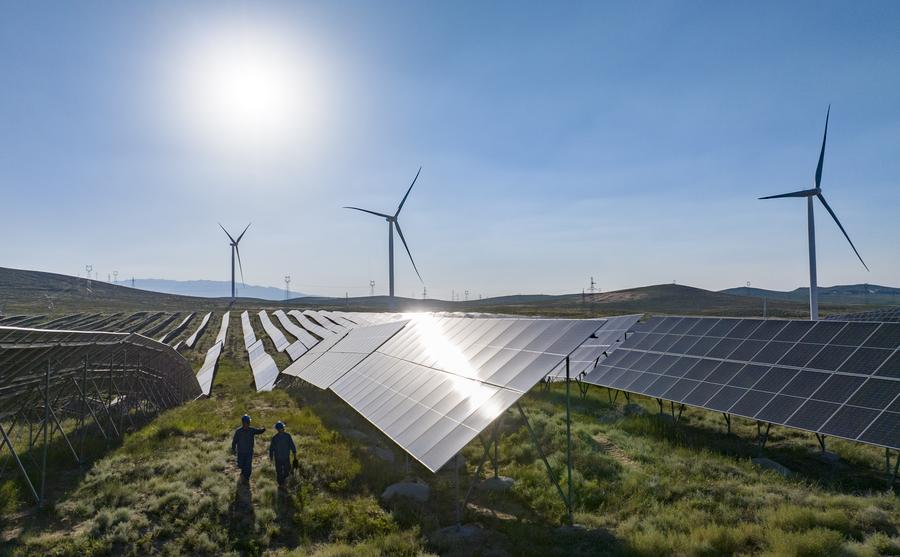
An aerial drone photo taken on Aug. 21, 2024 shows workers checking photovoltaic panels at a photovoltaic power station at Taiyangshan Township of Wuzhong, northwest China's Ningxia Hui Autonomous Region. (Xinhua/Yang Zhisen)
DOUBLE STANDARD
While fallaciously claiming that the Chinese government's industrial policies such as subsidizing green technologies have led to excess capacity, the West is adopting more industrial policies and protective subsidies, which is a clear double standard.
According to a recent study by the Industrial Policy Group at the Vancouver School of Economics, University of British Columbia, developed countries actually use industrial policies more frequently. Between 2009 and August 2020, the top five countries that used most industrial policies were Germany, Japan, Brazil, the United States and Canada, while China ranked only 11th among major economies.
China's use of subsidies is neither more "undisciplined" than others. Under the World Trade Organization's Agreement on Subsidies and Countervailing Measures, there have been a total of 138 cases. Among the three largest WTO trading members, the United States has been sued 44 times, the European Union (EU) 21 times (not including six separate cases against individual EU member states), both higher than China.
The accusation that China has excess capacity in green technologies is "absurd," the South China Morning Post reported, citing Stephen Roach, a senior research scholar at Yale University.
The West goes after China for subsidizing green technologies, and yet, the United States is doing the same thing, Roach said.
The U.S. Inflation Reduction Act, under the guise of addressing inflation, plans to promote the production and adoption of electric vehicles (EVs) and other green technologies domestically through numerous incentives, including substantial subsidies.
In France, subsidies of up to 4,000 euros (4,424 U.S. dollars) can be granted for electric cars priced under 47,000 euros (51,940 U.S. dollars), with an additional subsidy of up to 3,000 euros for lower-income households, according to the Global EV Outlook 2024 report by the International Energy Agency.
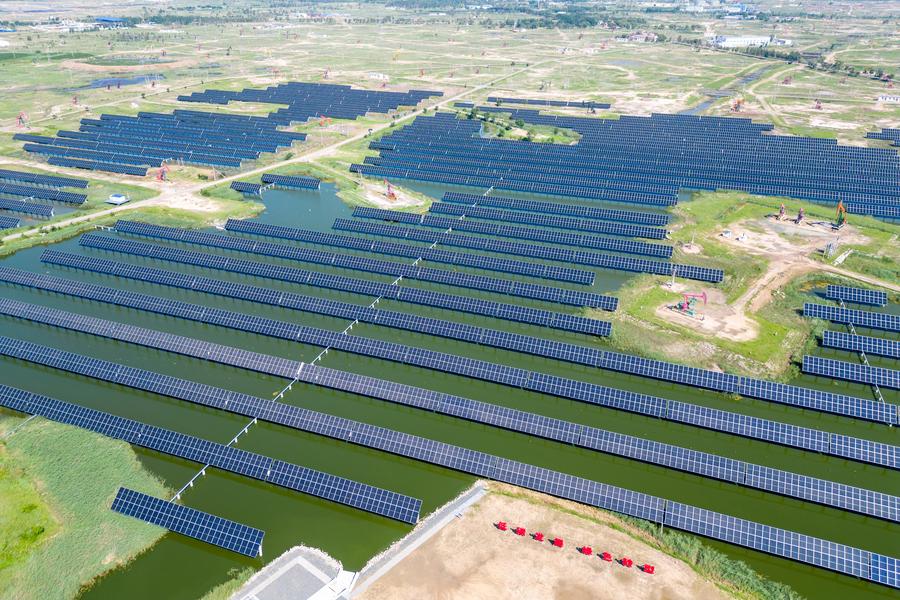
An aerial drone photo taken on Aug. 8, 2024 shows the Xinghuo Water Surface Photovoltaic Demonstration Project of Daqing Oilfield in Daqing, northeast China's Heilongjiang Province.(Xinhua/Zhang Tao)
REAL HARM
The overcapacity argument can be used as an excuse for protectionism, Lardy told Xinhua.
Many experts have warned that adopting protectionist measures to suppress China's advantages in the new energy sector and other fields will not only disrupt the stability of the global automotive supply chain, and harm businesses and consumers, but also hinder the West's green transition and global cooperation on climate change.
A recent CNN report said the United States and Europe are racing to narrow China's leading position in clean energy technologies, throwing subsidies at local manufacturers and hiking tariffs on Chinese imports in a strikingly protectionist turn.
However, without China's EVs, solar panels, wind turbines and batteries, reducing planet-heating pollution could take longer and ultimately increase costs for businesses and consumers, said the report.
"Politicians who want to restrict a nation like China, which provides green technology at low cost and high quality in areas like EVs and solar batteries, that is purely a political agenda that makes no sense from an economic comparative advantage point of view," Roach said.
The European Commission's plan to impose tariffs of up to 36.3 percent on Chinese-made EVs has sparked criticism among industry experts and business insiders across Europe, who warned that the move may worsen the competitiveness issues of the EU, hinder the region's green transition and escalate trade tensions with China.
Luigi Gambardella, president of the Brussels-based international digital association ChinaEU, criticized the EU's protectionist measures, stating that they "risk stifling future advancements in mobility technologies."
"EVs are crucial for Europe's transition to a low-carbon economy," Gambardella said, arguing that the proposed tariffs could further slow consumer adoption of EVs, undermining Europe's climate goals and delaying the shift away from fossil fuels.
He encouraged efforts to advance mutual investment, foster mutual growth and ensure that the benefits of EV technology are shared more widely.
Photos
Related Stories
- Putin denounces U.S. allegation of China's EV overcapacity as "nonsense"
- Commentary: "Excessive capacity," or "excessive lies" ?
- Claims of China's "overcapacity", tactics to justify trade protectionism
- U.S. accusing of China's "overcapacity" is protectionism: former Italian ambassador
- Commentary: Yellen's "wall of opposition" is built on quicksand
- "Problem of China's overcapacity" does not exist, says Chinese ambassador
Copyright © 2024 People's Daily Online. All Rights Reserved.









